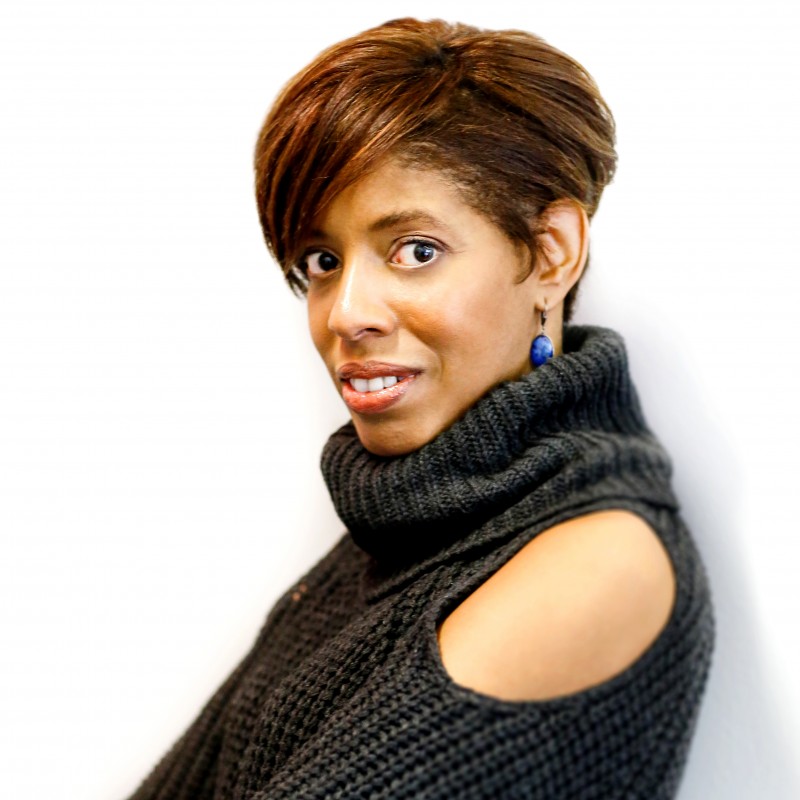An Interview with Lydia R. Diamond
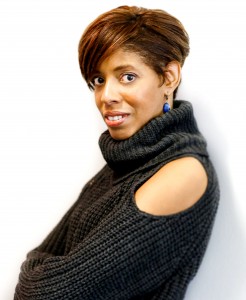
Written by Victoria Myers
Photography by Emma Pratte
February 16th, 2016
We met playwright Lydia R. Diamond on an unseasonably warm day in February (you know it’s winter in New York when everyone is constantly remarking about the weather) at a coffee shop a few blocks away from Second Stage, where her latest play, Smart People, was in previews. Between the potted plants in the window, the eclectic music coming from the radio (an actual radio), and Lydia’s warm and thoughtful manner, our conversation felt a little like what it must feel like to be inside one of the photos in an Anthropologie catalogue. That might seem like an odd way to introduce a writer whose current play is a thought-provoking and poignant look at race in America, but much like in Lydia’s play, the intersections between disciplines and interests is where the story lies. Smart People concerns a neuroscientist doing a controversial study on race, and the role that race plays for a group of people pursuing their ambitions. Lydia’s other plays include Stick Fly, Voyeurs de Venus, and The Bluest Eye, among others. We spoke to her about the genesis of Smart People, her writing process, plans for the future, and more.
(i.) Present
I read that Smart People started when you read an article about science and how we perceive race. I was curious about how that fit into your creative process for this play? Was it a jumping off point, or was it a moment of, “Oh, maybe that’s how these ideas in my head fit together”?
I would say the latter. Not so much that I wanted to write about this particular study, but that I was so affected when I read Susan Fiske’s article called Dehumanizing the Lowest of the Low. I was so affected by that work that was being done, since at that point I didn’t know about brain imaging and neuroscience and race, and of course it seemed like the perfect marriage. The level of resonance that the article had with me is what inspired the play. Then, to the degree that I wanted to write specifically about race, I then started looking at the other disciplines in the sciences, and there were all of these silos of this work being done and it made me think. It’s interesting that scientists exist in their little silos and I know there are think tanks and things like that where people are brought together, but I think not so much around race since it’s such a powder-keg.
The Interval has talked to a few writers who have done research for their plays, and I was wondering what your process was like for researching and incorporating the science into the play? Because we all know how to do research for a term paper, but it seems like for something creative, your brain has to synthesize the information in a different way.
Well, my brain helps me out with that because I have a funny brain that doesn’t do a good job at holding onto facts. And it’s funny because I was having migraines and I had my brain tested, and there were things that I learned about how my brain worked that would have helped me going through school. But one of the things I don’t do well is the remembering of little facts. Like in a science test in school—I was a straight A student because I had to be because of my mom—it was a struggle for me to remember facts like the periodic table and what year and who invented what. So what I do is I release that. I know I’m not going to remember the date and name of every study, but I absorb it. So for a year, or in this case two years, it was just reading everything and allowing myself to understand it the way a layperson would, because a lot of the science is written in a completely dense, hard to penetrate way. So I just decided to read it and let it wash over me, absorb it, and know that it was in there and it was the ideas that I needed to roll around in. I think as soon as you get too stuck in the specifics of science, especially for something that you’re extrapolating on and kind of making up a new hybrid, you could get so lost in the facts that it would turn into this weird, didactic, boring thing.
How did you come up with the structure of the play? There are a lot of solo moments and two-person scenes with shifting permutations. Did you find that happening organically or was it more purposeful?
It was absolutely organic. Almost always when I write, the characters and the story dictate the structure, and I don’t know what it will be until the play tells me what it will be. But I look at it now and it makes all the sense in the world because the whole conversation about race is so disjointed and disconnected, and it’s so hard for us to hold on to it, so it makes sense that a play about something that’s so slippery wouldn’t be in a well-made play structure. It comes as this burst of insights and anecdotal experiences—not always about race since we don’t walk through the world being and doing race—but that’s kind of the way it came to me. And it culminates in a trying-to-pull-it-all-together scene at the end of the play when we’ve already established these people in their little worlds like the silos I was talking about.
How much thought did you give to the gender, race, and occupation of each character (i.e. making it a black, male doctor rather than a black, female doctor)?
I didn’t handpick their professions to work into what I wanted the play to be. That came rather organically. I did know that I wanted a protagonist who was a neuroscientist who was doing this work—an extrapolation of all of these sciences I’d read about—and I knew I wanted him to be white, and I knew I wanted him to be a bit of a tragic hero. But beyond that, the others just organically materialized.
I read that you started working on the play in 2007 (the year the play takes place) and then it had a production at the Huntington in 2014. When you’re working on a play that’s about a very contemporary subject, and one where the dialogue has really continually shifted between 2007, 2014, and 2016, does that affect your process of working on the play? Do you have to put blinders on and keep it in its original state, or do you let it evolve?
When I first started, the campaigning [for President] had just started, and when Obama won it changed how I would talk about race and, for a while, it leveled me. It really asked that I step it up in a really profound way. The conversation, for me, felt more urgent but had to be more sophisticated than it ever had been. And then, after a point, I realized that I would have to shut this down because you can’t keep up with history. So I did put an, “Okay, this is where we are, we’re going to end at the election.”
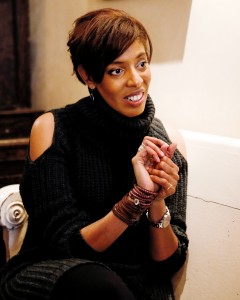
(ii.) Process
What is your writing process like? What’s your way into a story?
In broad brushstrokes, there would be theme. But when I say theme, I don’t start with a thesis statement, but in this case especially, I do know that I want this to be an exploration of the slipperiness and the nitroglycerin of race. And then the characters [come next] and I let them talk to one another and that dictates the form. Then I keep letting them talk to one another, and then I massage the structure of the play on the back end. There’s a lot of posting of scenes and of pages on the wall and on the floor and rearranging things and writing things to fill in holes. And even now, in the rehearsal process, just three days ago we took out two scenes. It’s a puzzle. And I’d say for my work that’s not even quite as collage-like as this piece, I still have this puzzle-like way that I put it together. Very seldom do I write in chronological order.
When you’re doing a first draft, do you write very quickly and just try to get all of your initial thoughts out? Or is it a slower process all the way along?
It’s slow. Very, very slow. A first draft is sort of rather arbitrary—what I even call a first draft. I often call the first draft “the first 100 pages.” And it evolves considerably from there. It’s usually by the third draft that it resembles the play you’ll see. Then it becomes very different during the rehearsal process.
(iii.) Sound and Visuals
Are there other areas of culture, like art or music, that affect your work?
Not as much as I think it could, at least not in a conscious way. I’d say it’s more of the sounds and textures of the world around me. Another thing about my brain is that I sort of hear everything at once. I have a weird time with sensory integration. I think that’s why I’ve picked up dialogue the way that I have. I hear every conversation in a restaurant at the same level, at the same time. I think there’s just this way that my brain has synthesized the world around me. So to that degree, yes, because every painting in a room, the music, the ambient noise affects it greatly. It’s funny, since when I teach I have my students do many museum exercises, but I don’t do them as much as I think I should and maybe will for my next play—consciously go to a museum and see what comes of it. My world is full of art, but I haven’t consciously had a physical image that has inspired something that way.
Do you have very strong instincts, then, about how you want the play to look and sound on stage?
I do. I think maybe because I started as an actor. I see it very specifically. I’ve been blessed to work with directors who respect that and bolster that. Like Kenny Leon brings all of his experience and savvy and vision as a Tony-winning director to the table, but just this morning I called him at like 6am and was like, “Oh my God, oh my God, I see the visuals of the epilogue we’ve been working with in a very specific way.” And he was able to say, “I’ve been thinking that too, and I’ve also been thinking…” And that can be quite a collaboration. But I do see things very visually, yes.
(iv.) Fashion
Do you have a dream cultural collaboration?
Funny you should ask. I’m writing a musical with Ladysmith Black Mambazo and Eric Simonson for the Steppenwolf Theatre Company in Chicago. They sent me to South Africa and I hung out with the guys on the tour bus for seven days and that is, right now, the most amazing coming together that I could have ever imagined being able to do. I would love to write a piece with dance. Lately I’ve been thinking I’d like to do a fashion play. I don’t know what that would look like at all, but how amazing would that be?
Do you mean incorporating fashion designers into the collaboration?
Yeah, I mean seriously a play about the fashion world. And then I’m like, “How would people do it low budget?” But I like the idea very much. Or even starting with a specific designer and saying, “I’d like to have a collaboration.”
For the Tonys last year, we did a piece on how fashion could be used to bring new audiences to theatre, especially since the museums and ballet have gone into that world and used it successfully.
When I did Stick Fly on Broadway, Andre Leon Tally—I guess he was friends with Alicia Keys—but we started emailing, and he came to the show and he invited me to an exhibit that he had, and that made me start thinking. We fell out of touch since that was a moment but it made me think, “Oh God, yes, that could be an interesting story.”
And could be told in an interesting way.
And could live in the politics that I live in. It could be all about race and gender and class and aesthetics. I’ve also thought I would love to be a clothing designer. I would kill to be Donna Karan. I think it’s such a big, important part of my life, but I think of it as frivolous in a way that doesn’t make sense, that’s very disconnected. So I think it would be interesting to look at moving through a world that’s theoretically frivolous but that is actually so important to everyone, even the people who don’t think it’s important—it’s a conscious decision to decide to be a person who doesn’t give a shit about clothes.
There’s a reason the Met has a Costume Institute.
Absolutely. So that interests me.
When you’re writing, do you know what your characters wear?
Yes, but I learned not to write that in the stage directions because designers can get very fixated on it, and I’ll be like, “Why is she wearing a bright pink hat?” And they’ll be like, “Because you said she’d wearing a bright pink hat and we looked all over town for it.” And I’ll be like, “Oh, sorry, I just saw it in my mind when I was writing, but it’s not important.” So I’ll write them and then go back and edit stage directions to make sure they’re integral to the story and so I’m not micromanaging the designers.
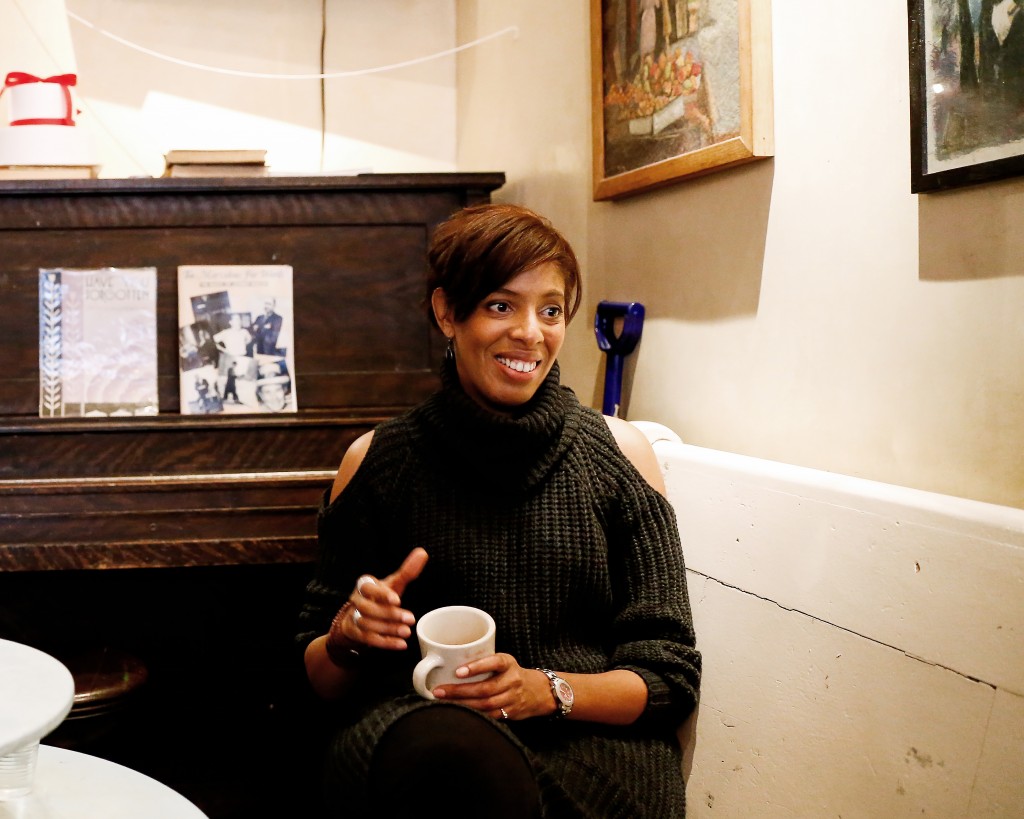
(v.) New Play Development
I wanted to ask you about new play development. It gets talked about a lot, but it always seems to make the most sense to ask writers. How do you think new play development can be improved?
That’s a question I haven’t been asked. I haven’t thought about it much. I write slowly and for the last several years I’ve been developing work in the same place. I used to have very strong opinions about development and how it doesn’t work and how it should work, and I’m less hard on institutions now about it. Maybe because I’m lucky enough to have benefited from it and have a sense of agency, so I can often mold it to what I want it to be. I’ve been blessed to have relationships with people [and places] like the McCarter Theatre who hung in there with me for seven years. They commissioned this play and let me have a reading whenever I wanted to, and invited me to their retreat this summer, and let me work on whatever I wanted to, which was mostly this play. I do think it’s nice when playwrights don’t have to feel encumbered by the weight of a potential production. I think it’s hard to create when the eyes of the producer are on you. So my relationship with the McCarter is different because I have a friendship with them, so I don’t feel, “I have to make this play perfect so they’ll give me a production.” And, again, the planets have aligned in my career so I tend not to be hungry for a production; I’m hungry to make the play the best play. But I do realize that’s a privilege. I do know there’s development when a theatre gives you a reading and two days of development and you know that’s an audition. And that’s not a good feeling, but it does feel like part of ecology of theatre. Because I have a child, I haven’t been able to take advantage of things like the O’Neill Festival—all of those things that I wish had come to me earlier in my career, I now find I have to be very selective about.
The childcare issue has come up a number of times; that development opportunities are not lined up to a schedule conducive to caring for a child.
It’s true. And to that degree, when you start talking about gender parity, that’s a really big thing. I do think it’s easier for the guys to leave and do their thing. There have been times in my life where I’ve been almost resentful of that. And I don’t know what the answer to do that would be. Well, yeah, I do—it’s money. It would take organizations being committed to having childcare. Having said that, there have been times when I have said in my contract, “I need…” Is fact, this production, I said I’m going to be need to be able to go home four times during the course of this rehearsal process because I have a child who needs me. It’s having the agency to ask for it, and I don’t know if playwrights always know that they have more agency then they think they do.
And that’s perhaps doubly true for women and a discomfort around asking things that have to do with children.
Absolutely. I came up in Chicago and I talk about Chicago like it’s the Mecca of theatre because that’s what it was for me. I very much grew up in rehearsal rooms where children ran around. In my first regional show at the Goodman, we had a corner for one of the actor’s children and we had pictures he painted, and whenever there was a sex scene an intern would take the kid out and then bring the kid back in. When I did The Bluest Eye at Steppenwolf, there was an actress who I would have breast-pumping contests with. And the director had toddlers running around, and we’d exchange clothing and anecdotes, and the most vivid memory I have is of the choreographer working with her baby latched on. It was like all babies and woman power. I think it can look that way. An artistic director just has to know that a room can look that way. I do find more often in institutions headed by women that there’s more flexibility around that, and an understanding that a child’s presence and creative focus are not mutually exclusive. There’s a certain life that comes out of having life in the room, and normalcy that I think we can embrace more artistically. I’m actually doing a workshop process in Wisconsin, and I’m taking my son who has Asperger’s. I’m trying to figure out how I’m going to do it—if I take a babysitter—but knowing that he’s welcome will make me so much more present in the room than if I’m there, worried that I’ve left him, and he’s going to end up in therapy talking about his mom.
(vi.) Themes
What do you see as the themes in your work? How do you feel they’ve changed or shifted over the years?
I’ve always very organically been drawn to conversations around race and class. They fascinate me because we’re so ill equipped to talk about them. But I would never, until this play, call it a political imperative. It’s just, that’s where I live. When I first started writing, I came at it through a sense of urgency and sometimes presumption—I knew what was wrong with our society, and I knew the answers, and I had a commitment to putting these things on stage so I could change the world. Then I got older and life happened to me in very specific and sometimes not good ways, and then I had a child and a husband who was not well sometimes. I was humbled by life in a way that made me have a lot less of that sense of knowing everything. For a while, I was shaken by that—and that happened actually through the writing of this play—but I figured out [how] to embrace it, and there was something compelling and deeper about saying, “I don’t know,” and writing either towards the answer or writing more towards embracing the question. I think that’s fruitful.
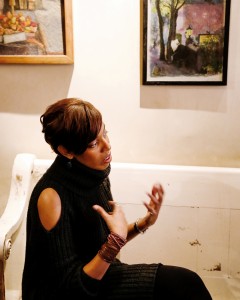
(vii.) Representation
Do you find when you’re writing about race or class, but probably mostly race, that when you have to go talk about it in the press that it becomes a whole other can of worms?
Sure. I notice that often right away they’ll go straight to the politics of race. I’m okay with that because I think that’s important. But I did start to realize, when I do panels and things like that, I’m so much more talking about myself as a person of color in the world or as an artist of color in the world, and I’m so much less often getting to have conversations about aesthetics. I don’t know if I resent that, but I bet that it would be nice in having to live with having to roll the ideas around in my head about the choices I’m making or the development of my aesthetic, and I don’t really ever have to actively think about that going into an interview.
It positions your play and process in a different space.
Exactly. Which is interesting, because at the same time I’m saying to people, “This is a play about family and love and hope,” I’m still knowing that I’m in this [space], and I think that’s part of being African American and an artist. We don’t get to separate ourselves that way. And that is what it is. It can be a burden and it can be a privilege, and either way a responsibility.
A question I ask writers a lot is if they feel their work is talked about differently than they think it would be if they were a male playwright.
Absolutely. Without a doubt. There’s no nuance around that. I have the double whammy of black and female, although I think I’m always black first. Some people always say, “Oh, the next August Wilson or Lorraine Hansberry,” and I think there are elements of my work that could be Wendy Wasserstein. I don’t know why I couldn’t. I have Pinter-esque pauses. Why has no one ever landed on that? I try not to read reviews, but there was one where someone compared me to Tyler Perry. And I don’t think that’s an insult since I think Tyler Perry has made himself a dynasty that is quite admirable, but it’s not what I do. It doesn’t resemble what I do in the least. There’s nothing that my writing does that looks like what he does. I thought that was weird. And I can’t imagine there’s any white writer on the face of the earth who someone would say reminds them of Tyler Perry. That’s a problem. That means there’s very few paradigms. And very few stylistic opportunities and a small range of stories we’re limited to. I’m venturing into television now, and there especially, I’ve found that there’s this idea of what a black experience is, and because I write what’s outside of what’s been allowed to be on stage, there’s a questioning of authenticity, which is beyond maddening. For a white producer, executive, artistic director [etc.] to tell me that my work isn’t black enough… I’m losing my mind.
(viii.) Past
What is the first piece of storytelling that had a major impact on you?
My brain just went to, weirdly, Sleeping Beauty. It must have been this book of Walt Disney fairy tales and there was this image of the prince with the sword and the queen has turned herself into the dragon and has flames. It would scare the bejesus out of me and I’d be like, “Not that page!” I don’t know why I landed on that because my mom railed against me having images that were only white as a child. To the degree that she would go in and watercolor Dr. Seuss books so they would have brown people in them sometimes. Because the world assaults our young people with images of people who don’t look like them, she wanted me not to be. So there was so much Ezra Jack Keats and fairytales. My world was full of these diverse stories, so it’s interesting that a Walt Disney story came to my mind, and then I feel like I have to explain that. I read a lot as a child. I was an only child with a single mom. So I skip forward to all of the stories of my youth that I’d sit in trees and read, like Little House on the Prairie and Watership Down and the JRR Tolkien books.
When did you first feel like a grown up?
My grandmother started to get Alzheimer’s, and before we knew that she was, she would tell these secrets about our family. I’d learn these things about my family that I just wasn’t supposed to know and I was like, “Wow I guess that’s it. The last vestige of childhood is gone. Because I so can’t un-know that now.”
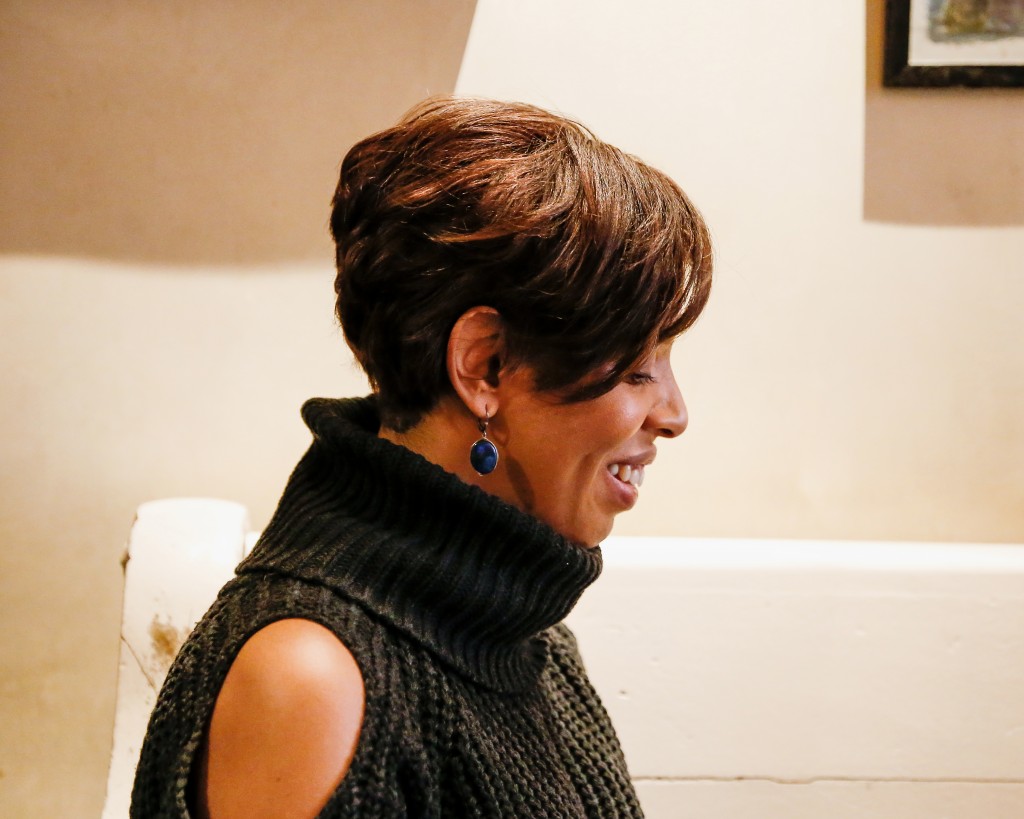
(ix.) Broadway
In 2011 your play Stick Fly was on Broadway. That year, there were more plays by women on Broadway than there will be this year or last year. What’s the experience like of being one of the handful of contemporary female playwrights to make it to Broadway?
I was aware of the significance of that because it was very significant for other people. Going through it I was putting up a play, so I was doing the thing I’m doing now of the fourteen-hour days in the rehearsal room. It was good because I would not have been able to wrap my head around how momentous it was and metabolize it. That’s probably right, because what I needed to do was enjoy the moment and be inside the rehearsal room with the people. It was the time outside the rehearsal room—there was intense press, there was Alicia Keys, and me having to stand next to Alicia Keyes and take pictures. She was lovely and disarming, but I spent a lot of time looking at myself too much, which made me not feel good about myself. And not knowing how to integrate myself into this world, which was a very new world to me. And if I had to do it again, I would not waste my time feeling that way. I think I understood how momentous it was on the backend of it. I think I got caught up in the noise of it in the middle of it, sometimes in ways that weren’t fruitful.
(x.) Future
What’s something you think people can do to improve gender equality in theatre?
Produce plays by women. It’s the same thing with diversity of color and aesthetic. Just produce some plays that don’t look like the plays you’ve been producing forever and don’t presume it’s some old, white audience seeing them, and the audience will diversify and the conversation will elevate. I’ve been having the same conversation about race in theatre for the past twenty years. When I was an undergraduate in college there weren’t mainstage plays about black people, there weren’t black people in the department, and a few years ago my college produced a play of mine and people flew in from out of town because this was a moment where black people were finally going to be on the mainstage. And that’s shameful. And that’s not limited to just my institution. I taught at Boston University, and they’re doing a play of mine at Emerson, and they’re doing a play of mine at a university in California, and over and over again it’s kids in these departments that aren’t getting the opportunity to be on stage, and specifically not in racially specific roles, which is a hole in their education. I could rail against that forever, and it’s the same thing: “Oh, we don’t know how to change that.” Well, you do the play. “Oh, there aren’t enough kids in the department.” So you admit more kids. “Oh, we don’t have the money to admit more people of color.” So you get more money. On and on and on. We’re theatre: we know how to put angels on stage, we know how to make people look like they’re levitating, we can lose electricity five minutes before a show and figure out how to put on a play, but we can’t figure out how to diversify theatre in America? That’s ridiculous.

